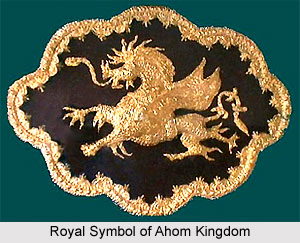 Sukhaamphaa was an Ahom king who ruled over the kingdom from 1552 to 1603 CE. His reign was the longest among the rulers of Ahom dynasty which continued for a period of fifty one years. He was a sports lover. Right after the succession of throne Sukhaamphaa once participated in elephant catching expeditions. He fell off an elephant and got a limp. For this reason he was often called as "Khora Roja".
Sukhaamphaa was an Ahom king who ruled over the kingdom from 1552 to 1603 CE. His reign was the longest among the rulers of Ahom dynasty which continued for a period of fifty one years. He was a sports lover. Right after the succession of throne Sukhaamphaa once participated in elephant catching expeditions. He fell off an elephant and got a limp. For this reason he was often called as "Khora Roja".
Sukhaamphaa was the son of an Ahom king Suklenmung and succeeded the throne after the death of his father. During his father`s reign Madhavdev and Sankaradeva had left the kingdom while during Sukhaamphaa`s rule the disciples of Madhavdev arrived to establish "Ekasarana Dharma" in the kingdom. The religion greatly blossomed during this period of time and numerous folks of kingdom including the high ranked officials adopted it. This led to a number of changes in the social set up of the kingdom.
The year 1562 marked a dispute of Sukhaamphaa with the Koch kingdom and following this Chilarai, the Koch general invaded the Ahom kingdom in January 1563. Ahom kingdom battled against them under the commandership of Burhagohain, Aikhek, but was defeated. Ahom capital Garhgaon was captured consequently. Sukhaamphaa then departed to Namrup. After some time, in the same year, peace negotiations started where Chilarai agreed to return the capital in exchange for a large region on the northern bank of Brahmaputra River. In addition to this the Koch general also demanded gold, silver, fabric and some sons of nobles as hostage. It was the `Treaty of Majuli`. When Sukhaamphaa returned to the capital he dismissed Aikhek from the office of Burhagohain on account of the defeat in the battle. He was then replaced by Chaopet. Ahoms later succeeded in recovering Narayanpur up to Sala. The Koch king Nara Narayana when began to face aggressions from Bengal, tried to mend relations with Ahoms by releasing their hostages.
The reign of Sukhaamphaa witnessed many other aggressions and invasions but among all of them the Koch invasion always remained the toughest period. Apart from this, Sukhaamphaa also faced conflicts with Sutiyas and the Naras. When the Nara king of Mungkang invaded the Khamjang region of Ahom kingdom another battle took place in 1576 in which the Naras initially defeated the Ahoms in Namrup and reached up to the Sesa River. The Ahoms however later succeeded in pushing them back. Sukhaamphaa had a natural death in 1603 in at Khowang. Susenghphaa was his son who succeeded the throne after his death.



















